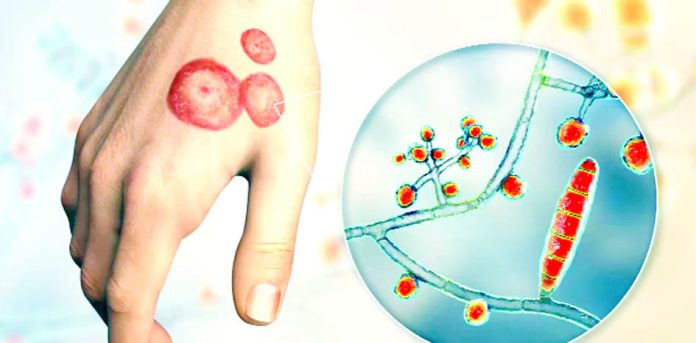Dr Cheena Langer
In recent years, fungal infections have become a growing concern worldwide, particularly in hot and humid climate like India. These infections affect millions of people and are caused by microscopic organisms called fungi, which thrive in warm, moist environments. While fungal infections are not typically life-threatening, they can be incredibly irritating and persistent, often impacting an individual’s self-esteem and social interactions. Understanding the causes, symptoms, and treatment options for fungal infections is essential for prevention and effective management.
Recognizing the Telltale Signs
Fungal infections often manifest on the skin with noticeable symptoms, the most common being itching, which can range from mild to severe . Other symptoms include skin discoloration, with infected areas appearing red or brown, with bumps and rashes. The affected skin may have a scaly or cracked texture, and in some cases, a foul odor, particularly in infections affecting the feet or groin area. Since these symptoms can mimic other skin conditions, it is crucial to consult a doctor or dermatologist for proper diagnosis and treatment.
The Breeding Ground for Fungi
Fungi thrive in warm, moist environments, making areas like the armpits, groin, and feet particularly susceptible. Tight clothing and excessive sweating create ideal conditions for fungal growth, while poor personal hygiene further increases the risk. Environmental factors also play a significant role; walking barefoot in public areas like swimming pools, locker rooms, and gyms can expose you to fungi, as can wearing damp shoes and socks for prolonged periods. Effective prevention involves minimizing these conditions to reduce the risk of infection.
Spreading Like Wildfire
Fungal infections are highly contagious and can spread easily through direct contact with an infected person or animal, especially for infections like ringworm. Indirect contact, such as touching contaminated surfaces, can also lead to infection. Maintaining good hygiene in public spaces and avoiding sharing personal items are crucial steps in preventing the spread of fungal infections. Within households, sharing towels, bed linens, or clothing can quickly transmit the infection among family members, highlighting the importance of isolating personal items and practicing good hygiene.
Effective Treatments
Treating fungal infections requires a multi-pronged approach. Topical antifungal medications, available as creams, ointments, powders, or solutions, are the first line of defense. For severe cases, oral antifungal medications may be necessary. However, it is essential to use these treatments under the guidance of a healthcare professional to ensure their effectiveness and avoid potential side effects.
Steroid Misuse
While topical steroids can reduce inflammation and itching for certain skin conditions, using them to treat suspected fungal infections without proper diagnosis can be dangerous. Steroids can suppress the immune response, creating a morefavorable environment for fungal growth, potentially worsening the infection and making it harder to treat. Prolonged or inappropriate use of steroids can also lead to side effects like skin thinning and increased risk of skin infections. Therefore, it is crucial to consult a healthcare professional to treat suspected fungal infections.
Your Dermatologist’s Guidance
Early detection and treatment are vital for preventing complications and ensuring a speedy recovery from fungal infections. If you notice unusual symptoms like itching, redness, scaling, or discoloration on your skin, consult a dermatologist promptly. A consultation typically involves examining your skin, discussing your medical history and lifestyle habits, and possibly taking a sample for further testing to confirm the diagnosis.
Prevention is Key
Preventing fungal infections is easier than treating them. Simple yet effective hygiene practices and lifestyle modifications can significantly reduce the risk of developing these infections. Keep your skin clean and dry, shower daily, especially after exercising, and use mild soap. Pay particular attention to areas prone to moisture, like the armpits, groin, and between the toes. Wear clean, breathable clothing made of natural fibers like cotton to allow your skin to breathe and prevent moisture buildup. Avoid sharing personal items, such as towels and razors, and protect your feet in public areas by wearing shower shoes or flip-flops.
Winning the Battle Against Fungi
Fungal infections, though a nuisance, are manageable with the right knowledge and approach. By understanding the causes, symptoms, and treatment options, you can take proactive steps to prevent and effectively manage these infections. Early detection and treatment are crucial for preventing complications and ensuring a speedy recovery. If you suspect a fungal infection, consult a dermatologist for an accurate diagnosis and personalized treatment plan. Good hygiene practices, simple lifestyle modifications, and maintaining a healthy lifestyle are key to reducing the risk of fungal infections. Remember, prevention is always better than cure. With the right information and proactive measures, you can win the battle against fungi and enjoy healthy, clear skin.
(The author is Consultant Dermatologist Aastha Skin & Dermato- Cosmetic Centre, Jammu)
Trending Now
E-Paper


